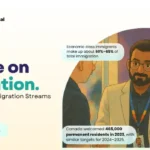Step-by-Step Guide to Study in Germany
Introduction
Planning to study in Germany after high school? If your 12th-grade certificate or diploma doesn’t meet the direct admission requirements of German universities, enrolling in a Studienkolleg becomes your essential first step.
A Studienkolleg is a one-year preparatory course that bridges the gap between your country’s education system and Germany’s academic standards. During this program, you not only strengthen your subject knowledge but also improve your German proficiency and academic skills. Consequently, it prepares you to qualify for a bachelor’s degree in Germany with confidence.
In this guide, you’ll discover everything you need to know — from eligibility checks and document preparation to entrance exams, visas, and settling into life as a Studienkolleg student.
What Is a Studienkolleg, and Why Do You Need It?
A Studienkolleg helps international students align their qualifications with German university requirements. It plays a vital role by:
- Bridging the academic gap between your home education system and the German Abitur.
- Offering subject-specific courses relevant to your chosen bachelor’s degree.
- Strengthening your German language skills while introducing you to Germany’s academic culture.
- Preparing you for the Feststellungsprüfung (FSP), the final qualifying exam required for university admission.
There are two main types of Studienkollegs:
- Public Studienkolleg: Tuition-free, highly competitive, and recognized across Germany.
- Private Studienkolleg: Paid programs with smaller classes and flexible intakes; however, always verify recognition with your target university.
Who Needs a Studienkolleg?
You are required to attend a Studienkolleg if:
- Your 12th-grade certificate or diploma is not equivalent to the German Abitur.
- You haven’t completed at least one year of university education in your home country.
- Your intended program requires subject-specific preparation (for example, medicine or engineering).
- Your German proficiency is below B2, and you need additional language support.
- Your qualification is not listed for direct admission in the Anabin Database.
In short, if your educational background doesn’t directly align with Germany’s higher education system, Studienkolleg serves as your bridge to eligibility.
Step-by-Step Admission Process
Step 1: Choose the Right Studienkolleg Track
Each Studienkolleg offers stream-specific courses that match different fields of study:
- T-Kurs: Engineering and Technical Sciences
- M-Kurs: Medical and Biological Sciences
- W-Kurs: Business, Economics, and Management
- G-Kurs: Humanities, Arts, and Literature
- S-Kurs: Language and Social Sciences
Your chosen track determines which bachelor’s degrees you can pursue later, so select carefully based on your career goals.
Step 2: Check Your Eligibility
Before applying, confirm that your qualification is valid for Studienkolleg admission. You can verify this through the Anabin Database.
Additionally, check language requirements — most public Studienkollegs expect a B1 or B2 level in German. Strong grades in subjects related to your intended track will also increase your chances of acceptance.
Step 3: Prepare the Required Documents
Gather the following documents in advance to avoid delays:
- Valid passport and passport-size photos
- 12th-grade certificate and transcripts (translated to German or English)
- APS Certificate (mandatory for Indian students)
- Language certificate (German B1/B2 or English for private colleges)
- Curriculum Vitae and motivation letter
- Proof of application fee payment
Make sure all documents are correctly attested and translated by certified translators.
Step 4: Choose Between Public and Private Studienkolleg
Public Studienkollegs are tuition-free and widely recognized but highly competitive. Admission is tougher and seats are limited.
Private Studienkollegs, on the other hand, charge tuition (usually €3,000–€7,000 per year) but often have smaller classes, personalized support, and multiple intake options. However, confirm that the private college is accepted by your target university before applying.
Step 5: Submit Your Application
You can apply in two main ways:
- Through Uni-Assist: Apply to multiple universities simultaneously using a centralized platform.
- Directly to the University or Studienkolleg: Submit directly for faster processing (check each institution’s requirements first).
While both routes are valid, using Uni-Assist ensures standardized document evaluation, which many universities prefer.
Step 6: Receive an Admission or Entrance Exam Invitation
Once your application is reviewed, you’ll receive either:
- A direct admission offer, or
- An invitation to the Aufnahmeprüfung (entrance exam).
Keep this official letter safe since you’ll need it for your student visa application.
Step 7: Arrange Finances and Open a Blocked Account
Before your visa interview, open a blocked account (Sperrkonto) with at least €11,208 — the required amount to cover one year’s living expenses in Germany.
This step is mandatory for all international students and demonstrates financial readiness.
Step 8: Apply for a German Student Visa
Book your appointment with the nearest German Embassy or Consulate. Prepare and submit:
- Admission or entrance exam letter
- Blocked account confirmation
- APS certificate and academic transcripts
- Health and travel insurance
- Valid passport and photos
Be punctual and keep extra document copies during your appointment.
Step 9: Get Your Visa and Arrange Travel Insurance
After approval, collect your passport with the stamped visa. Arrange travel insurance that covers the period until your German health insurance activates.
Travel insurance is not just a formality, it’s essential for your safety and compliance during your first weeks abroad.
Step 10: Prepare for the Aufnahmeprüfung (Entrance Exam)
The entrance exam tests your German language proficiency and subject-specific knowledge based on your chosen track. Practice previous years’ question papers, take online sample tests, and focus on time management.
Additionally, joining short-term online preparation courses can give you an extra edge.
Step 11: Travel to Germany for the Entrance Exam
Arrive at least a few days before the test. This extra time helps you adjust to the new environment, locate your exam center, and familiarize yourself with the process. Always carry your essential documents and valid health insurance proof.
Step 12: Wait for the Results
Most Studienkollegs release exam results within a few days or weeks. Once you pass, you can officially begin your Studienkolleg program. If unsuccessful, you can retake the exam or explore private options.
Step 13: Begin Your Studienkolleg Journey
After arrival, complete all formalities promptly:
- Register your local address (Anmeldung)
- Open a local bank account
- Activate your health insurance
- Attend your orientation and first classes
Embrace your new academic life — this year will build the foundation for your German university studies and future career.
Conclusion
Enrolling in a Studienkolleg is a gateway to higher education in Germany for thousands of international students every year. Although the process involves several steps, careful planning and early preparation can make your transition smooth and successful.
By understanding the admission process, preparing your documents properly, and staying proactive, you’ll be one step closer to studying at a world-class German university — with confidence, readiness, and clear direction.
With SPS Global, you get:
- Step-by-step admission guidance
- German language training (A1 to B2)
- Visa and blocked account assistance
- Entrance exam preparation support
Receive professional advice on any of your questions regarding Canadian immigration. get in touch with us, experienced immigration consultants from SPS Global. For additional information, contact support@spscanada.com (Canada) or support.amd@spscanada.com (Ahmedabad), or by phone at (1) 905-362-9393 (Canada) or +919586226232 (Ahmedabad).


